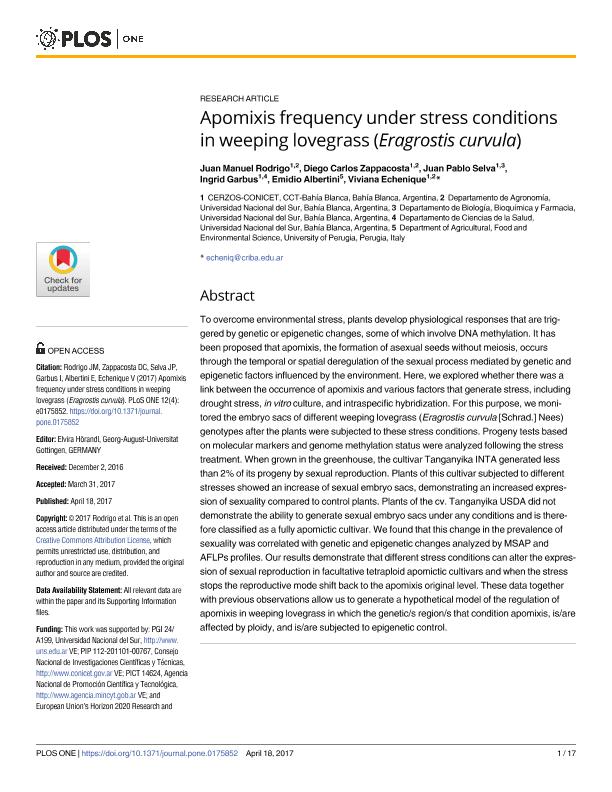Artículo
Apomixis frequency under stress conditions in weeping lovegrass (Eragrostis curvula)
Rodrigo, Juan Manuel ; Zappacosta, Diego Carlos
; Zappacosta, Diego Carlos ; Selva, Juan Pablo
; Selva, Juan Pablo ; Garbus, Ingrid
; Garbus, Ingrid ; Albertini, Emidio; Echenique, Carmen Viviana
; Albertini, Emidio; Echenique, Carmen Viviana
 ; Zappacosta, Diego Carlos
; Zappacosta, Diego Carlos ; Selva, Juan Pablo
; Selva, Juan Pablo ; Garbus, Ingrid
; Garbus, Ingrid ; Albertini, Emidio; Echenique, Carmen Viviana
; Albertini, Emidio; Echenique, Carmen Viviana
Fecha de publicación:
04/2017
Editorial:
Public Library of Science
Revista:
Plos One
ISSN:
1932-6203
Idioma:
Inglés
Tipo de recurso:
Artículo publicado
Clasificación temática:
Resumen
To overcome environmental stress, plants develop physiological responses that are triggered by genetic or epigenetic changes, some of which involve DNA methylation. It has been proposed that apomixis, the formation of asexual seeds without meiosis, occurs through the temporal or spatial deregulation of the sexual process mediated by genetic and epigenetic factors influenced by the environment. Here, we explored whether there was a link between the occurrence of apomixis and various factors that generate stress, including drought stress, in vitro culture, and intraspecific hybridization. For this purpose, we monitored the embryo sacs of different weeping lovegrass (Eragrostis curvula [Schrad.] Nees) genotypes after the plants were subjected to these stress conditions. Progeny tests based on molecular markers and genome methylation status were analyzed following the stress treatment. When grown in the greenhouse, the cultivar Tanganyika INTA generated less than 2% of its progeny by sexual reproduction. Plants of this cultivar subjected to different stresses showed an increase of sexual embryo sacs, demonstrating an increased expression of sexuality compared to control plants. Plants of the cv. Tanganyika USDA did not demonstrate the ability to generate sexual embryo sacs under any conditions and is therefore classified as a fully apomictic cultivar. We found that this change in the prevalence of sexuality was correlated with genetic and epigenetic changes analyzed by MSAP and AFLPs profiles. Our results demonstrate that different stress conditions can alter the expression of sexual reproduction in facultative tetraploid apomictic cultivars and when the stress stops the reproductive mode shift back to the apomixis original level. These data together with previous observations allow us to generate a hypothetical model of the regulation of apomixis in weeping lovegrass in which the genetic/s region/s that condition apomixis, is/are affected by ploidy, and is/are subjected to epigenetic control.
Palabras clave:
Stress
,
Reproduction
,
Apomixis
Archivos asociados
Licencia
Identificadores
Colecciones
Articulos(CERZOS)
Articulos de CENTRO REC.NAT.RENOVABLES DE ZONA SEMIARIDA(I)
Articulos de CENTRO REC.NAT.RENOVABLES DE ZONA SEMIARIDA(I)
Citación
Rodrigo, Juan Manuel; Zappacosta, Diego Carlos; Selva, Juan Pablo; Garbus, Ingrid; Albertini, Emidio; et al.; Apomixis frequency under stress conditions in weeping lovegrass (Eragrostis curvula); Public Library of Science; Plos One; 12; 4; 4-2017; 1-17; e0175852
Compartir
Altmétricas



